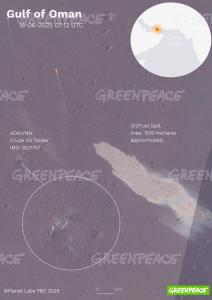Greenpeace MENA on Gulf of Oman oil spill: Swift intervention needed to prevent environmental disaster
Satellite imagery indicates a large plume of oil stretching up to around 1500 hectares from the site of the crash between the two vessels, ‘Adalynn’ and ‘Front Eagle’, in the Gulf of Oman, approximately 22 nautical miles east of Khor Fakkan, near the Strait of Hormuz.
The UAE Ministry of Energy stated that the collision between the two tankers resulted in limited surface damage to the outer structure of both vessels, and a fire broke out in the fuel tank of one of them, which was extinguished. No injuries were reported among the crew members, according to the Ministry.
The 23-year-old Adalynn is part of the so-called Russian ‘shadow fleet’, a collection of partially obsolete tankers that operate below basic security standards and carry Russian oil, though its current cargo is unknown.
Analysis of the Adalynn’s current 9.3-metre draught suggests it may be carrying approximately 70,000 tons of crude oil despite being officially listed in ballast condition.[2]
Farah Al Hattab, Campaigner at Greenpeace Middle East and North Africa, said: “This is just one of many dangerous incidents to take place in the past years. The causes differ, but the result is often the same: oil spills endanger marine life, disrupt delicate ecological balances and possibly the entire food web, and carry the potential to spark widespread environmental damage that extends far beyond the immediate area."
Al Hattab added: “Greenpeace MENA urges all concerned authorities to act swiftly to contain the spill and assess its ecological impact. We call on shipping companies, governments, and oil industry actors to commit to full transparency regarding the environmental consequences of oil spills and the measures being taken for cleanup. Additionally, we urge governments in the region to increase investment in maritime monitoring, early-warning systems, and contingency plans to effectively respond to future oil pollution incidents. Environmental security must be treated as national and regional security.”
“The environmental fallout from this collision further highlights the urgent need to transition away from fossil fuels. Continued reliance on oil infrastructure leaves both people and the planet exposed to toxic spills, political conflict, and the accelerating climate crisis. It’s time to rethink our global energy systems, shifting to renewable energy as an urgent pathway to sustainability”.
END
Notes:
1. Satellite image https://media.greenpeace.org/Detail/27MZIFJRBAFKQ© Planet Labs PBC, Greenpeace
2. Sources: www.Q88.com and seasearcher.com
Contacts:
For media inquiries or interview requests, please contact Hiam Mardini, Communications and Media Manager at Greenpeace MENA: hmardini@greenpeace.org
Hiam Mardini
Greenpeace MENA
+961 71 553 232
email us here
Visit us on social media:
LinkedIn
Instagram
Facebook
YouTube
TikTok
X
Other
Legal Disclaimer:
EIN Presswire provides this news content "as is" without warranty of any kind. We do not accept any responsibility or liability for the accuracy, content, images, videos, licenses, completeness, legality, or reliability of the information contained in this article. If you have any complaints or copyright issues related to this article, kindly contact the author above.
AMEA Dubai 2025 Returns Bigger with Bitumen, Base Oil, Logistics, Co-Located with Roads, Traffic & Mobility (ARTM)
Oakland’s Erlich Law Firm Raises Concerns Over AI-Based Bias in Employment Practices
Utility Poles Market Poised for Growth as Energy and Telecom Demand Surges
Więcej ważnych informacji
 Jedynka Newserii
Jedynka Newserii

 Jedynka Newserii
Jedynka Newserii

Polityka

Polska może się stać Doliną Krzemową Europy. Potrzeba jednak wsparcia finansowego start-upów i mocniejszej deregulacji
Polskie start-upy skoncentrowane są głównie na rozwoju nowoczesnych technologii informatycznych i cyfrowych. Wyraźny nacisk na oprogramowanie i aplikacje oraz big data i data science wskazuje na silne zainteresowanie narzędziami analitycznymi i rozwiązaniami wspierającymi transformację cyfrową w różnych branżach – wynika z raportu „Rynek start-upów w Polsce. Trendy technologiczne”, który został opracowany w 2024 roku w MRiT. Zdaniem europarlamentarzystów Polska ma szansę się stać Doliną Krzemową, jednak rozwój start-upów blokowany jest m.in. przez ograniczony dostęp do finansowania oraz niekorzystne i nadmierne regulacje.
Transport
Na półmetku wakacji ceny paliw na stacjach nie powinny się wyraźnie zmienić. Znaczące różnice między regionami i stacjami

W sierpniu ceny benzyny, oleju napędowego i autogazu powinny pozostać na poziomach z lipca – uważa ekspertka rynku z firmy Reflex. Wyższe będą zawsze na stacjach premium, tych, które oferują bogatszą ofertę dodatkową, promocje dla uczestników programu lojalnościowego, oraz w regionach, w których tradycyjnie paliwa są droższe ze względu np. na wyższą siłę nabywczą mieszkańców. Różnice mogą sięgać kilkudziesięciu groszy na litrze. Obszary, wokół których te wartości oscylują, zależą z kolei od sytuacji globalnej. Warto patrzeć na sytuację na Bliskim Wschodzie i w Ukrainie.
Polityka
A. Mularczyk (PiS): Nawiązanie poważnego dialogu z Niemcami jest konieczne nie tylko w kontekście reparacji. Powinien być podpisany traktat polsko-niemiecki

– Nie wystarczy jednorazowy gest czy inicjatywa. To musi być podjęcie dialogu, być może też przygotowanie nowej umowy bilateralnej, nowego traktatu polsko-niemieckiego, który regulowałby wszystkie obszary, które wynikały ze skutków II wojny światowej – mówi Arkadiusz Mularczyk, poseł do Parlamentu Europejskiego z PiS-u. Podkreśla, że proces ten nie będzie łatwy, bo wymaga konsekwencji i stanowczości, ale widzi szansę w prezydenturze Karola Nawrockiego, który już zadeklarował kontynuację starań w tym zakresie. Zdaniem europosła wsparciem w polsko-niemieckim dialogu może być administracja Donalda Trumpa.
Partner serwisu
Szkolenia

Akademia Newserii
Akademia Newserii to projekt, w ramach którego najlepsi polscy dziennikarze biznesowi, giełdowi oraz lifestylowi, a także szkoleniowcy z wieloletnim doświadczeniem dzielą się swoją wiedzą nt. pracy z mediami.




![Nestlé w Polsce podsumowuje wpływ na krajową gospodarkę. Firma wygenerowała 0,6 proc. polskiego PKB [DEPESZA]](https://www.newseria.pl/files/1097841585/fabryka-nesquik_1,w_85,r_png,_small.png)




.gif)

 |
| |
| |
|